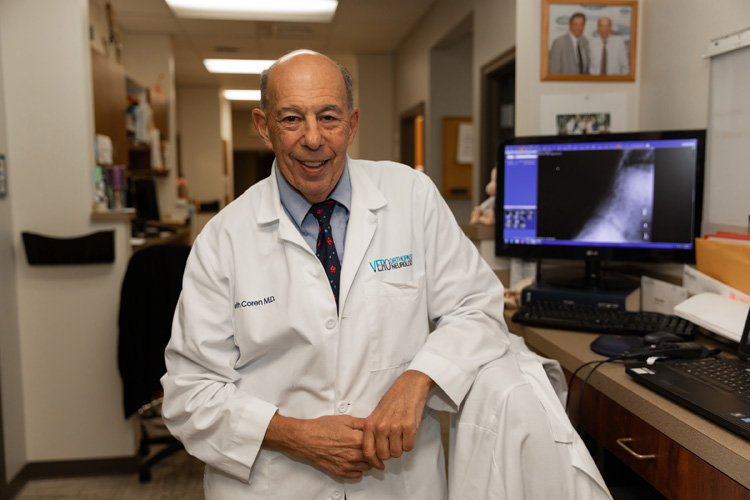
At the beginning of April a new osteoporosis drug from Amgen grabbed headlines nationwide when the Food and Drug Administration approved its use for a select group of patients.
But there is even bigger osteoporosis news – locally, anyway – that comes from Dr. Seth Coren of the Osteoporosis and Bone Health Center at Vero Orthopaedics, who has convinced Cleveland Clinic Indian River Hospital to launch what he calls a “fracture liaison service.”
It is a service that is sorely needed, according to Coren, and he says it didn’t take all that much convincing.
Right now, all Vero Orthopaedics patients who come into the hospital with a fractured hip or pelvis are offered a “consultation” on osteoporosis by Coren, along with treatment if needed, but he wants to do more. He wants to offer those consultations and treatments to prevent future fractures to all such patients at the hospital, whether they’re Vero Orthopaedics patients or not.
“In the past,” Coren continues, “I hadn’t gotten any support from the [hospital] administration to expand this to the general population,” but, he says, Cleveland Clinic has stepped up.
The hospital’s new management said, “Yes. Let’s do this. This is part of treating patients.”
“We’re now in the process of creating a fracture liaison service. That’s so important. Only about 15 percent of the people who break their hip are evaluated and treated for osteoporosis after their initial fracture, and statistics show there is a significant risk of a second or even third fracture within one or two years of the first,” if the underlying condition of osteoporosis is not treated.
“So,” says Coren, “we’re now in the process of creating assistance where, not only do patients get treated appropriately for their broken hip, but [we educate and use specific medications] so they don’t come back with another broken hip in the next year or two.”
“If you come into the hospital with a heart attack, before you leave, there is a checklist,” Coren says. “You have to have beta blockers, you have to have this, you have to have that.” In his eyes patients with osteoporosis-related bone fractures deserve the same kind of precautionary treatment and education.
And speaking of precautionary treatment, let’s get back to that new osteoporosis drug, which is known as “Evenity” or “romosozumab.”
The New York Times calls it “the first new treatment approach for osteoporosis in nearly two decades,” but Coren, a stickler for detail, singles out what he calls an error in the Times report.
The Times wrote: “Standard treatments, drugs called bisphosphonates, stop the loss of bone but do not build it.” Coren says that’s not altogether true.
He says existing medications including Forteo, Tymlos, Fosamax, Boniva and Prolia “do help you build bone. They just do it in a different method.”
In any case, in two large clinical trials, patients given Evenity as a once-monthly injection saw impressive increases in their bone density.
But Coren warns it is not a panacea. And it’s not without risk.
As the FDA reports, “Evenity may increase the risk of heart attack, stroke and cardiovascular death, so it’s important to carefully select patients for this therapy, which includes avoiding use in patients who have had a heart attack or stroke within the previous year.”
Evenity is currently approved only for post-menopausal women who have not suffered a heart attack or stroke in the past year and have “a history of osteoporotic fractures or multiple risk factors for fractures, or those who have failed or are intolerant to other osteoporosis therapies,” according to the FDA.
That’s just fine by Coren. To him, the new drug is “just one piece of the puzzle and a tool.”
“I’m not a big fan of rushing into new medications,” he adds.
“If you come in with mild osteoporosis, do I want to put you on this drug? Probably not. Now, in three years, after we have some more experience with it, then I may say this is what we do first.”
Probably the best news about Evenity is that Medicare likely will pay most of the nearly $19,000 cost that 12 months’ worth of injections costs.
The FDA says the “effects of the Evenity wanes after 12 doses,” so its use is for one year only, before patients have to switch to other medications.
If things go the way Coren hopes, his collaboration with Cleveland Clinic Indian River Hospital in developing a hospital-wide fracture liaison service will continue far longer than just 12 months, lasting until, someday, osteoporosis can finally be cured or prevented entirely.
Dr. Seth Coren is with the Osteoporosis and Bone Health Center at Vero Orthopaedics/Neurology at 1155 35th Lane in Vero Beach. The phone number is 772-569-2330.



